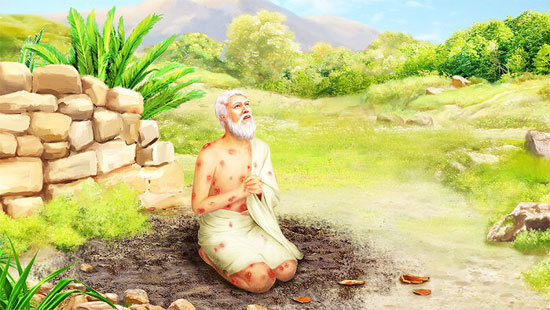If God Is Good, Why Is There Suffering?
“Why?” is a question we often ask about suffering. This question is so important because it directs people in one of two directions: toward God or away from God.
We ask this question for ourselves, and for others. Often our “why” is not just the inquisitive “why” of a child, but it is the angry, confident “WHY?” that is more an argument than a question. We act as if we know there is no good reason for what is occurring.

Have you come to a satisfactory solution to the question of why there is suffering? Is there an answer?
Suffering is an inescapable part of our world. It draws our attention completely inward. How do we deal with it? We want to make sense of it. We live in a cursed time. “God made the world, but He allowed rebellion (sin), which affected creation and our lives. All of us rebelled against Him” (Gen. 3; Rom. 3). Therefore, the world is marked by suffering.
And from the Book of Job, we see three truths that will help answer even more.
1. The Plain Truth About God and Job
“God is all-powerful; Job and his friends both agree on this” (Job 26, 34, 36, 37:14, 23).
Non-Christian friend, what do you think about God and what He does? Is it evident to you that God is all-powerful?
Job and friends agree that God is all-good. Elihu says it is unthinkable that God would do wrong or pervert justice (Job 34). They understood that God blesses those who are good. Bildad explains that God, because of His goodness, punishes the wicked (Job 8:3, 20).
This book clearly teaches us that God is omnipotent and all-good. He blesses the righteous and punishes the wicked. And that is normally evident in this life because that testifies to what God is like.
Job is suffering amazingly; his friends do not dispute this. His situation was more difficult than normal. Job had lost all 10 of his children in a single day just a week before this dialogue begins. He also lost all his possessions and his standing in the community. In chapter 29, Job has a nostalgic look back.
The Bible is very realistic about suffering. Christianity is centered on an all-good God who came as a man and suffered and experienced death. Jesus understands us. We are not to put our hope in this life or any good thing God gives us. God’s goodness and power and Job’s suffering fit together. That is what has brought people to the book of Job.
Much of your suffering has nothing to do with your sin. But mark it well, sin makes for the worst suffering. God warns us of suffering now so we don’t have to be afraid of it later. God may be giving you the biggest megaphone of your life in your suffering. “And when your sin is deep, the suffering is strong, and your resolve is weak, remember: He gives more grace.” (James 4:6).
2. How Job Is a Puzzle
To his friends, Job’s guilt was so obvious that they can see his suffering from a distance. His guilt was clear to them from the magnitude of his suffering. But Job professed innocence to them (Job 13, 31). Job was not maintaining like he was completely innocent, but was saying he had not sinned in such a way as to bring this kind of severe suffering upon himself.
Job’s innocence is comparative only. None of us are as sinful as we could be, but our sin has affected every part of us. The Bible teaches clearly that everyone deserves hell as a punishment for our rebellion against God (Rev. 20:11-15; Luke 16:19-31, etc.).
Job was also puzzled himself. He was confused over why God would treat him like this if He were his friend? Job is confused as to why he is suffering so much if God is his God. An all-powerful God that is not all good would be a terrible monster to us.
What Job believed about God’s goodness seemed to be confuted by the prosperity of the wicked (Job 21). If God is all-good and all-powerful, then why has He allowed this to happen? We see injustices all throughout history.
The book of Job isn’t philosophical – why we suffer – but practical, that is, how to suffer – namely, by clinging to God. “If God loves me, why do I suffer so?” you may ask. God himself allows the suffering, to save me from a faith that doesn’t ask questions. “If you are a sinner today, Jesus will be your sacrifice. If you suffer, He will be a sympathetic High Priest, too.” (Heb. 4:15)

It is not God’s kindness that allows sin and prosperity to continue together; that is a part of God’s judgment – to allow sin and prosperity together in our lives. It is God’s kindness when He wakes us up. If God allowed a perfect man, Jesus Christ, to suffer terribly, why should we think that something like that could never happen to us?
3. How God Is a Puzzle
We know why Job is suffering as he is. Without chapters 1-2, we wouldn’t know whether Job or his friends are correct.
Eliphaz presented a question as evidently false (“Of course, God doesn’t bring a charge against you for piety!”), but that is actually the key truth in unlocking the whole puzzle as to why Job is suffering! Eliphaz’s rhetorical question was in fact revealing the truth.
See the danger of truths misapplied. Their arguments imply Job’s friends thought themselves innocent because they weren’t suffering like Job. But the whole story turns precisely on the fact that they were not as good as Job. If they had been as good as Job, they could have been suffering like him. It was because of Job’s piety, not his sin, that God had allowed this suffering upon him. God knew this would bring Him praise, glory and honor.
The Book of Job isn’t addressing a hypothetical question about why good people suffer but a very practical question instead: “How to suffer.” The Book of Job tutors us in how to suffer when we don’t know why: accept it, keep trusting God, and hold on. When (not if) we suffer, it simplifies the only finally important question: “What does God think of me?”
When we suffer, the primary question is not, “Why is this happening to me?” but, “What does God have for me in this?”
“Let those who suffer according to God’s will entrust their souls to a faithful Creator.” (1 Peter 4:19).
Where Does This Leave Us?
God is mysterious by nature, but He has also revealed Himself to us in the Bible. We will not have all the answers to all the questions in this life. Suffering for the Christian is rarely about “learning a lesson.” It’s mostly about the cross. We need to realize this world is not mainly about us; it is about God. To solve the puzzle of God, we first need to realize that the difference between His nature and ours.
God is patient; full justice does not always come immediately. Our salvation hangs on that fact. Not all suffering in this life is punishment. God may teach through suffering (Job 33). Or, it could be discipline (Heb. 9-12).
But now God is about other things than merely punishing. We do reap what we sow, but we do not only reap what we sow. God uses suffering to teach us more about Himself, us and our need for Him. God is patient even sometimes when we wish He wasn’t. The Gospel makes the suffering to be more bearable, it gives it purpose and – best of all – an expiration date.
Furthermore, God is trustworthy. He has proven himself by His faithfulness. As bitter as Job’s complaints are, he seemed to know that God was trustworthy. The call to trust God is at the heart of Job and the call to us. Know the Redeemer lives – even in the midst of suffering by sin and God’s providential plan for His glory in our lives.
yogaesoteric
June 23, 2019
